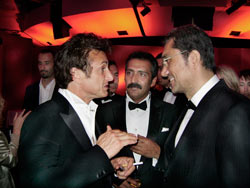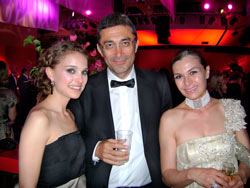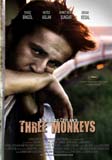
|
 61th
CANNES FILM FESTIVAL 2008 61th
CANNES FILM FESTIVAL 2008 
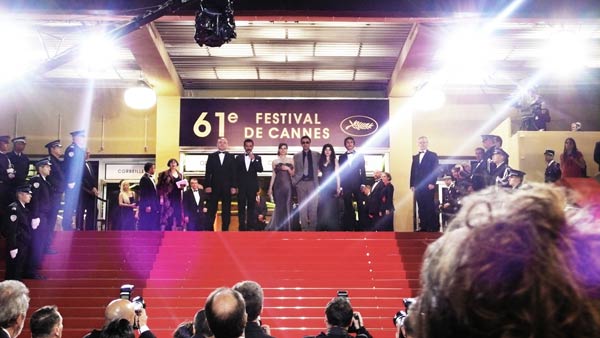 Red Carpet during
the premiere of "Three Monkeys"
Red Carpet during
the premiere of "Three Monkeys" |
COMPETITION FILMS :
-- "Entre Les Murs" (Class), by Laurent Cantet (France)
-- "Üç Maymun" (Three Monkeys), by Nuri Bilge Ceylan (Turkey)
-- "Le Silence De Lorna" (The Silence of Lorna), by Jean-Pierre and Luc Dardenne (Belgium)
-- "Un Conte de Noel" (A Christmas Tale), by Arnaud Desplechin (France)
-- "Changeling", by Clint Eastwood (United States)
-- "Adoration", by Atom Egoyan (Canada)
-- "Waltz With Bashir", by Ari Folman (Israel)
-- "La Frontiere De l'Aube" (The Frontier Of Dawn), by Philippe Garrel (France)
-- "Gomorra", by Matteo Garrone (Italy)
-- "Two Lovers", by James Gray (US)
-- "24 City", by Jia Zhangke (China)
-- "Synecdoche, New York", by Charlie Kaufman (United States)
-- "My Magic", by Eric Khoo (Singapore)
-- "La Mujer Sin Cabeza" (Woman Without A Head), by Lucrecia Martel (Argentina)
-- "Serbis", by Brillante Mendoza (Philippines)
-- "Blindness", by Fernando Meirelles - (Brazil)
-- "Delta", by Kornel Mundruczo (Hungary)
-- "Linha de Passe" (Line of Passage), by Walter Salles, Daniela Thomas (Brazil)
-- "Che", by Steven Soderbergh (United States)
-- "Il Divo", by Paolo Sorrentino (Italy)
-- "Leonera", by Pablo Trapero (Argentina)
-- "The Palermo Shooting", by Wim Wenders (Germany)
Out of competition:
-- "Vicky Cristina Barcelona" by Woody Allen (United States)
-- "The Good, The Bad, The Weird" by Kim Jee-Woon (South Korea)
-- "Kung Fu Panda" by Mark Osborne, John Stevenson (United States)
-- "Indiana Jones and the Kingdom of the Crystal Skull" by Steven Spielberg (United States)
- Turkish Press
For the Turkish Press during and after the Festival, please click here. (in Turkish)
( Cannes Film Festivali sırasında ve sonrasında Türk Basını için buraya tıklayınız. )
|
International Press during the festival :
... One of the most heavily touted contenders is Three Monkeys from Turkey, not a country that used to spring to mind in discussions of cinema - that is, until Nuri Bilge Ceylan's earlier film Climates established him as a world-class director.
Stephanie Bunbury, The Sydney Morning Herald, May 13, 2008
... I saw another picture today, "Three Monkeys" from the Turkish writer-director Nuri Bilge Ceylan, whose "Climates" remains one of the few masterworks I've seen in world cinema this new century. Ceylan's latest is visually extraordinary and often arresting, a simple tale of a blackmail arrangement that leads to adultery and horrific recriminations. I'm talking to Ceylan tomorrow, so more on this one later. With its exquisite sense of composition and color, to be sure, "Three Monkeys" proves that Ceylan is leading the vanguard when it comes to high-def digital video's expressive possibilities.
Michael Phillips, Chicago Tribune, May 15, 2008
... One of Cannes' favourite film-makers, Turkey's Nuri Bilge Ceylan, returned to the film festival offering a breather from hard-hitting movies on social themes with a highly personal family drama. Ceylan, almost 50 and already winner of a batch of awards for his first four features, is regarded as one of the most distinctive film-makers of the last decade.
His latest offering, "Three Monkeys", a searing family tragedy revolving around jealousy, is his third appearance in competition at Cannes, where the movie is tipped as a front-runner among the 22 vying for the festival's prestigious Palme d'Or award.
Agency France Press, May 16, 2008
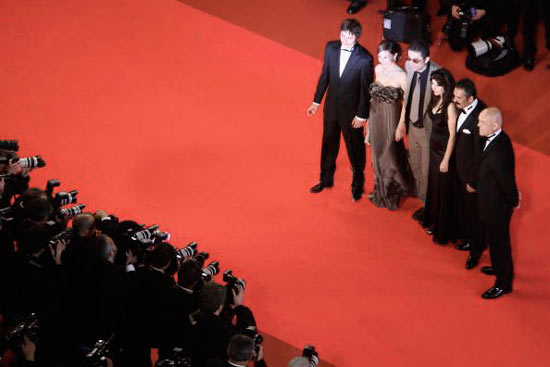 On the Red Carpet at
the premiere of "Three Monkeys"
On the Red Carpet at
the premiere of "Three Monkeys" |
It's only the third day of the festival but already I feel a bit out of step. I responded very negatively last night to Turkish director Nuri Bilge Ceylan's competition entry Three Monkeys -one of the favourites for the Palme D'Or going into the festival - and now I'm feeling slightly abashed, convinced that my reaction was wrong.
The story of a politician who kills a man in a hit-and-run and then arranges for his driver to go to prison for him, only then to begin an affair with the man's wife, seemed a rather gloomy and clunky construction last night. Dealing rather heavy-handedly with guilt, suspicion and the moral consequences of betrayal, it felt like a claustrophobic and forced misfire for Ceylan after the comparative grace of the two features he bought to Cannes in previous years - Uzak and Climates.
Now I'm wondering if I didn't just succumb to one of those festival brainstorms whereby you don't read a film correctly. You can be affected by so many factors here at Cannes - you're hungry, tired, uncomfortable, other films are still playing on your mind or the person next you has really bad personal hygiene. I had a few of those things going on during yesterday's screening of Three Monkeys, which is why I'm going to be a dutiful professional and see it again today at midday.
It would be nice to come out of every film you see here with a fixed and final opinion - not to mention a few pithy gags - on every film. Sadly though, it takes awhile for things to settle before you can sift through how you really feel. Getting a chance to see a major film twice is a real luxury at Cannes, but I'm going to take this rare chance while I can.
David Cox, Channel4, 16 may 2008
... We saw Turkish director Nuri Bilge Ceylan's Three Monkeys, a poignant film I can only describe as a psychological thriller. With his talent for framing, composition and colors, I want to imagine Ceylan was a painter in a previous life; some stills from the film are worthy of a magical visual artist's best work. The actors are all extraordinary, but I was especially moved by the expressive and supremely beautiful Halice Aslan, the only woman in the movie.
On our way back to the hotel, on the Croisette, we ran into two of the film's leading actors, whom we were happy to congratulate.
Mary Laure, Blogspot, 16 May 2008
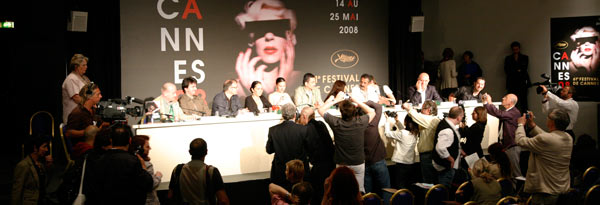 Press Conference
Press Conference |
An ostensibly routine noir-style psychological thriller vaults into the realms of high art in competition contender Three Monkeys. Cannes has been kind to Turkey's Nuri Bilge Ceylan in the past, with Uzak and Climates establishing his auteur credentials here in 2003 and 2006. His new film represents a bold departure from his past style: it's best described as introspective melodrama, yet both visually and tonally, it's still quintessential Ceylan.
For the first time, Ceylan really involves himself in narrative complexity, spinning a subtly-twisty yarn with echoes of such crime writers as Simenon and James M. Cain. Three Monkeys will consolidate Ceylan's reputation among art-house cognoscenti, but should win him new fans too. Its genre bent should give it a niche crossover appeal for export, in ways that Uzak and Climates never quite reached.
Using HD video in steely, washed-out hues, Ceylan and DoP Tiryaki provide the beautifully composed cityscapes that have become the director's trademark, as well as facial studies that speak more eloquently about characters' conflicting emotions than the common run of close-ups. A gorgeous, digitally-manipulated final shot gives the film a troubling open ending that can only stir debate and send intrigued viewers back for a second viewing.
The only cavil is that the pacing gets a little slack in the final stretches, and - while it's the nature of a Ceylan film to be slow-burning - the smallest amount of trimming could well turn an exceptional film into a near-perfect one.
Jonathan Romney, Screen International, 16 May 2008
... One of the films at Cannes that I’m most eager to see is the latest from Nuri Bilge Ceylan… Three Monkeys. (No, it’s not a prequel to Twelve Monkeys.)
You absolutely have to put Hatice Aslan at the very top of the list of Best Actress winners here. I don’t care what comes along between now and Friday the 23rd — her performance is knockout stuff. Ditto Yavuz Bingol for Best Actor. I read somewhere that Ceylan, in the tradition of Robert Bresson, doesn’t use professional actors; I read somewhere else that he uses friends who are actors– just not famous ones. I’m sure someone will point out what an ignoramus I am for not knowing this stuff chapter and verse.
It’s obviously early to be talking Palme D’Or winners, but when a film has the Unmistakable Right Stuff, you know it right away. Moral fortitude, razor-sharp vision and stylistic sure-footedness of this calibre are impossible to ignore.
Great art-house movies are something very close to entertainment. They take you out of yourself and into a realm that adds to your empathy and understanding of life’s infinite sadness. They turn you on with their mesmerizing style and condensed capturings of instantly recognizable human folly. When films of this sort really deliver they satisfy in ways that stay with you for decades. They add meat to your bones.
Jeffrey Overstreet, Looking Closer, May 15, 2008
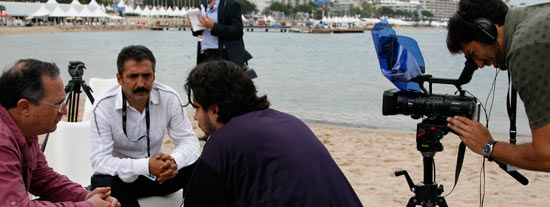 Interview with actor Yavuz Bingöl
Interview with actor Yavuz Bingöl |
The moral undercurrent in Nuri Bilge Ceylan's Three Monkeys -- a quietly devastating Turkish family drama about guilt, adultery and lots of Biblical thunderclaps -- is in every frame. It's about people doing wrong things, one leading to another in a terrible chain, and trying to face or at least deal with the consequences but more often trying to lie and deny their way out of them. Good luck with that.
I was hooked from the get-go -- gripped, fascinated. I was in a fairly excited state because I knew -- I absolutely knew -- I was seeing the first major film of the festival. Three Monkeys is about focus and clarity in every sense of those terms, but it was mainly, for me, about stunning performances -- minimalist acting that never pushes and begins and ends in the eyes who are quietly hurting every step of the way...
It's a very dark and austere film that unfolds at a purposeful but meditative (which absolutely doesn't mean "slow") pace, taking its time and saying to the audience, "Don't worry, this is going somewhere...we're not jerking around so pay attention to the steps."
Ceylan and his cinematographer Gokhan Tiryaki are into filling their frames with muted but luscious browns, grays, blacks (lots of black) and faded greens. The visuals are such a bath that Three Monkeys almost deserves a standing ovation for this alone. But it's the unstinting sense of engagement with the moral cost of what's being done and lied about and covered up that matters. It's heavy material, all right, but it's not a reach to call it the stuff of classic tragedy. The script (by Ceylan, Ebru Ceylan and Ercan Kesal) is right up Will Shakespeare's alley...
And ohhh, that thunder! Four or five times it growls and rumbles like God's angry symphony. Lightning, too, at the very end.
I think Three Monkeys is fundamentally a political film because it's telling an eternal political truth, which is that people with money and power rarely pay for their wrong-doings -- they simply arrange for someone down the food chain to take the rap. And then sometimes they fuck the rap-taker's wife for good measure...
Jeffrey Wells, Hollywood Elsewhere, 15 May 2008
....The best film of the second day was Three Monkeys, the fifth feature of the exceptionally talented Turkish director Nuri Bilge Ceylan. His previous work, Climates, was my favorite film of year in 2006. Climates brilliantly navigated the emotional and personal contours of a couple’s relationship that Ceylan imbued with a lyrical, sharp register of pain and regret. The new film is grungier and shadowy, detailing a different kind of guilt concerning the fallout of an unusual business transaction between an ambitious politician and the personal driver who agrees to take the blame for his boss’s crime.
The drama pivots on the emotional wreckage of the unorthodox arrangement that expands to the driver’s wife and son. Thematically, the film is a sharply drawn noir about behavior and consequence — it binds a malicious dark humor to a trenchant exploration of circumstance and fate. Visually, Three Monkeys is frequently astonishing. Like Climates, the movie is shot in high-definition digital video. Chicago Tribune film critic Michael Phillips has written perceptively about the influence of Chekhov in Ceylan's work — and that influence is especially evident here. Ceylan is also especially adept at creating an environment and a mood: The bleached-out colors and crystalline images attain a level of photorealism that gathers a tremendous immediacy and vitality.
Patrick Z. McGavin, Stop Smiling, May 17, 2008
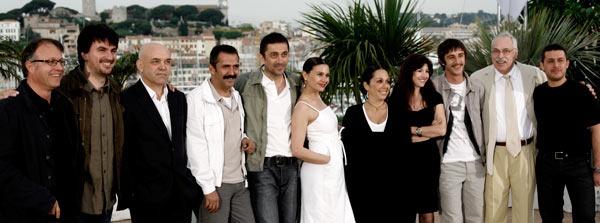 Photocall
Photocall |
... It's no secret that the films of Turkish auteur Nuri Bilge Ceylan are an acquired taste... No one working in cinema today can suggest an interior psychological state, solely through the camera's external observation of an unmoving character, as well as Ceylan can. Also, he uses the entire frame, which is always perfectly composed for maximum expressivity, whether in a long-held extreme long shot, or in a devastating close-up. Differential focusing and camera angle are also meticulously thought out, and the emotional tension created in a few purposely drawn-out scenes can be excruciating. The new territory, besides the emphasis on family dynamics, includes the occasional unnerving appearance of a long-dead younger brother, and several subtle feints in the direction of a apparently new religious sensibility.
Peter Brunette, Hollywood Reporter, 16 May 2008
... Primary thesps are superbly convincing as a dysfunctional unit. Absent for most of the first half, Bingol dominates the second with his volatile fits of temper. Aslan is both maddening and sympathetic as the frustrated seductress, and handsome Sungar has heartbreaking moments as a son who, it's suggested, has borne more than his fair share of the emotional burdens.
While Servet's selfish actions impel the drama forward, the political content and latent class tensions never distract from the core dynamic. But "Three Monkeys" reaches the point of diminishing returns in its final reels, as the tale relaxes its vise-like grip and its machinations begin to seem transparent and overdetermined in retrospect. And aside from a darkly comic cell-phone ringtone that steals every scene it's in, the wry humor that made "Distant" so memorable is mostly absent here.
Reteaming with Climates' dop. Gokhan Tiryaki, Ceylan again offers beautifully composed HD images of exceptional depth and texture. In keeping with the angst-ridden tenor, however, his color palette seems deliberately murkier and more constrained than usual, occasionally drifting past sepia into the realms of puke-green. In some ways, the extraordinarily crisp and detailed soundscape is even more impressive, making audible the scrape of tires on gravel and the unyielding rhythms of the sea.
Justin Chang, Variety, 16 May 2008
Narrative lurches notwithstanding, “Three Monkeys” offers the kind of artistry rare in contemporary cinema. Little details linger in the mind, such as a knife on a cutting board, tipping slightly in the breeze. Ceylan gets wonderful suspense out of everyday things, such as a telltale cell phone ring-tone that wails to the tune of a vengeful Turkish pop ballad.
Most indelibly, the film’s brief but brilliant depictions of the dead son grip the audience like nothing else so far in this year’s Cannes festival.
Michael Phillips, Chicago Tribune, May 16, 2008
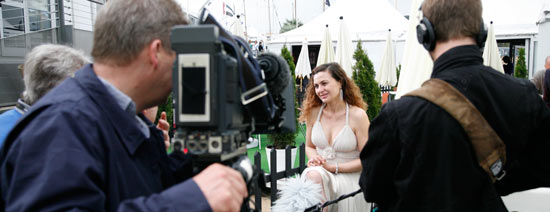 Interview with actress Hatice Aslan
Interview with actress Hatice Aslan |
The film is visually quite pretty to look at, in spite of its moody browns and greys. Aslan's portrayal of a woman caught in a marriage she didn't realize she was chafing against until her husband goes away is quite strong; the latter scenes of the film, when she clings to her lover in the hopes of sustaining the temporary taste of freedom are quite powerful and moving. Bingol is also good; his seething rage upon learning of his wife's affair culminates in a tense scene between them in the bedroom in which you fear, along with Hacer, that the consequences of her fling might end up being tragic. And they do -- but, to Ceylan's credit, not in the way you expect.
The characters in this tale evoke a lack of moral grounding and thinking through of things that, perhaps, is intended to reflect upon broader implications of a societal tendency to make decisions within a bubble of self-absorption. Ceylan evokes a larger societal allegory by titling the film Three Monkeys; as much as this is a story about this family and the decisions they make to avoid facing the truth, it's also about our societal tendency to close our eyes to that which we'd prefer to ignore, and to make decisions in our lives for the immediate perceived benefit rather than the long-term implications.
Kim Voynar, Cinematical, 25 May 2008
After a somewhat lukewarm day two, filmwise, day three got started off with a bang. Actually, “bang” may not be the correct word, because Three Monkeys, like Ceylan’s previous films Distant and Climates, is slow and methodical, and filled to the brim with emotionally-charged pauses and long silences. But “day three got started off with a lot of emotionally-charged pauses and long silences” just doesn’t have quite the same ring.
Still, compared to the gorgeous but emotionally dry Climates, Three Monkeys seems almost conventional, at least from a narrative point of view. It deals with a family, the father of which goes to jail after being paid to take the fall for a hit-and-run accident committed by his employer, a prominent Turkish politician. While in jail, the man’s son begins hanging out with a street gang, and his wife carries out an affair with the politician. Once he is released, he must deal with the consequences of these events, which gets even harder once the politician turns up murdered.
It sounds like the stuff of a pulp novel, but Ceylan’s style never allows for straight-forward narrative process. The title refers to seeing, hearing and speaking no evil, a metaphor for how the family deals with its situation and provides Ceylan with the basis of his formal strategy. None of the tragedies that occur throughout the film are presented on screen; instead, we are shown the characters’ reactions to them. Ceylan is interested in exploring the nature of truth and denial, and he repeatedly is able to craft the perfect images to fit his themes. Characters are often isolated in the frame, either in long shots or extreme close-ups, and the stylized, grim color scheme results in some absolutely stunning images. Among the most beautiful recent films I’ve seen, Three Monkeys is my favorite of the fest so far.
Matt Noller, House Next Door, 21 may 2008
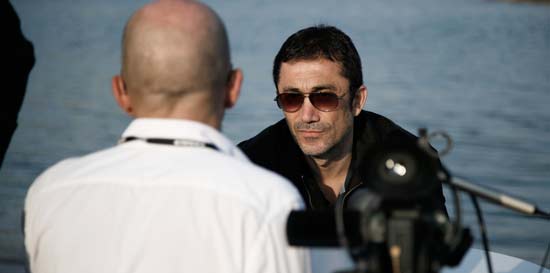 Interview with the director Ceylan
Interview with the director Ceylan |
On the arthouse front in Cannes, of the films competing for the festival’s top Palme d’Or prize, the most applauded by critics to date was Turkey’s "Three Monkeys" by Nuri Bilge Ceylan, a tale set around family tension.
Times, May 16, 2008
... I'm extremely excited about the Ceylan, and think that "Climates" is one of the most beautiful high-def features to date (though I still prefer "Distant," I think), but I wonder if Ceylan's expressiveness in the format is linked to an understanding of its limitations. Based on "Climates" and the image above, he's shooting in a very stark, flat, desaturated style, which is something that video can handle pretty well. (See also: "Zodiac") But I remain dubious about how video can handle strong colors in a way that's remotely comparable to celluloid; it's not on Ceylan to address my concerns, but I'm always hesitant to endorse a high-def feature without some qualifications.
Another note : Ceylan is equally brilliant in sound. Part of what gives his work such a tactile, 3D-ish quality are his soundscapes, which vividly complement his imagery.
Scott Tobias, Chicago Tribune, May 16, 2008
... More stark but compelling stuff came with the competition entry Three Monkeys, a departure by Turkish maestro Nuri Bilge Ceylan. As noir as thrillers come, this is the story of a working-class family breaking down when the father takes the rap for a hit-and-run accident. It starts in the Simenon bracket and ends up approaching Dostoevsky - with perhaps a dash of the Coens. Right now, it's my favourite contender for the Palme d'Or.
Jonathan Romney, The Independent, 16 May 2008
Turkish director and arthouse favourite Nuri Bilge Ceylan again impressed with Three Monkeys. Like Climates and Uzak, it is a study of dislocation, a husband and wife drifting away from each other after he agrees to take a nine-month stretch for his boss following a hit and run. In return for his loyalty, he will receive a lump payment upon his release from prison. What he didn’t bargain on, though, is his wife falling for his boss while he’s away…
Again shot in Ceylan’s signature long takes, with a soiled palette of nicotine browns and urine yellows – which he somehow arranges into painterly compositions – Uc Maymun watches intently and unflinchingly as pain and resignation deepens in the heavy flesh of the characters’ faces. It is overwrought in places, with a few too many foghorns and rumbling trains underscoring the anguish, but this absorbing drama still deserved its round of applause as the credits rolled.
Jamie Graham, May 16, 2008, Total Film
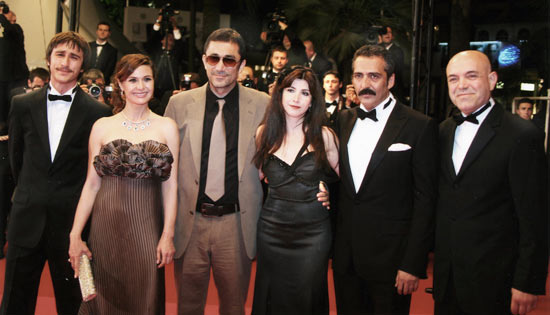 On the red carpet
On the red carpet |
I was hooked from the get-go -- gripped, fascinated. I was in a fairly excited state because I knew -- I absolutely knew -- I was seeing the first major film of the festival. Three Monkeys is about focus and clarity in every sense of those terms, but it was mainly, for me, about stunning performances -- minimalist acting that never pushes and begins and ends in the eyes who are quietly hurting every step of the way. It's a very dark and austere film that unfolds at a purposeful but meditative (which absolutely doesn't mean "slow") pace, taking its time and saying to the audience, "Don't worry, this is going somewhere...we're not jerking around so pay attention to the steps."
Jeffrey Wells, Hollywood elsewhere, May 16, 2008
Our Man in Cannes: Nuri Bilge Ceylan’s best film ever
Director Nuri Bilge Ceylan of Turkey has been a critical favorite in Cannes ever since “Climates” premiered here a few years ago.
He has been so well-regarded among film snobs that Joel and Ethan Coen last year showed a short film about a cowboy (Josh Brolin) who goes to an L.A. theater and asks the ticket seller to describe “Climates.”
The result was hilarious, in a Coen brothers kind of way. (Ceylan typically focuses on moods, not events, so “Climates” is quite hard to describe.)
So it was interesting to see Ceylan’s latest, “The Three Monkeys,” on Thursday night. I’ve never been a big Ceylan fan. I respect his work, especially the cinematography. But I’ve usually been faced with watching his movies at 10 p.m. here in Cannes, and if there’s not much going on up on the big screen, I tend to nod. (That’s a horrible admission, but it happens all the time. I sat next to a critic who slept last night.)
Remarkably enough, I was engrossed by “The Three Monkeys” from the very beginning. It’s the best Ceylan film ever, not that such a comment will mean much to most people.
It focuses on a politician who is involved in a hit-and-run on a dark, lonely road. He gets out of the car, but hides when another vehicle shows up. The driver doesn’t stop to help, but calls police with the license plate number of the abandoned politician’s car.
The politician, knowing he’s in trouble, pays a man who occasionally works as his driver to confess to the hit-and-run and go to prison. Regular paychecks will be sent to his family, and a big payday will come when he is freed, should he remain silent.
To say any more would give away too much of the plot. But one deception leads to another, and another, and another.
Ceylan’s cinematography is wonderful, once again.
Charles Ealy, Austin360, May 16, 2008
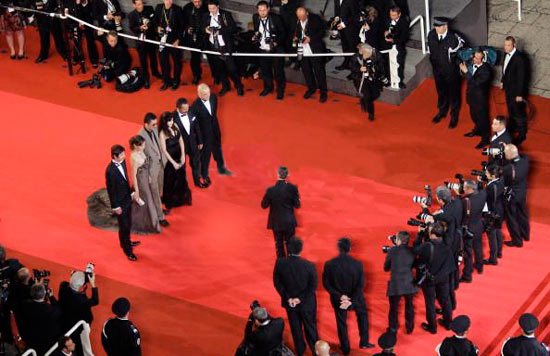 On the Red Carpet
On the Red Carpet |
... But for now, my personal favourite in competition – and a definite Palme d'Or contender – is Three Monkeys, by Nuri Bilge Ceylan, the Turkish director who made his auteur reputation at Cannes with his features Uzak and Climates. Ceylan vaults into new territory here: Three Monkeys is a noir-flavoured psychological thriller, which starts off close to Georges Simenon, slides more into James M Cain territory, and ends up vaulting into the Dostoyevsky league. A driver is persuaded by his politician boss to take the rap for a hit-and-run accident, in exchange for payment that will ease his family's financial troubles. The driver goes to prison; his son drifts into bad company; his wife gets involved with the politician – and when the driver gets out of jail, things slide toward even darker consequences. It is very much a Ceylan film – there are all the elegant, brooding cityscapes we expect of him – and the elliptical intrigue is typical of his sombre, slow-burning style. But here we find Ceylan having the sort of fun with narrative twists you might expect from the Coen brothers, and the moral resonances leave you feeling you've grappled with not just a teasing enigma but a substantial tragedy too.
Jonathan Romney, The independent, 18 May 2008
... The film to which I was looking forward the most was Nuri Bilge Ceylan's Three Monkeys - but I have to confess to a tiny twinge of disappointment. It was many things at once: tragedy, melodrama, suspense thriller and a twist of the supernatural. An unscrupulous politician crashes his car on a remote road, kills a pedestrian, and takes off before anyone sees what happened; then he persuades his driver to take an accidental death rap on his behalf and do nine months in jail for a secret cash payoff. The man's family have to live with the resulting guilt and humiliation. Taken singly, none of the film's elements was anything less than superb; there was nothing in it which wasn't gripping, and wonderfully filmed. Yet I felt it was overloaded. Ceylan's two previous films, Distant and Climates, were less-is-more classics; here, the dramatic focus is too diffuse.
Peter Bradshaw, Guardian, May 19, 2008
... The haunting center of “A Christmas Tale” - the death of a first sibling at the age of six - also lingers over another strong competition entry, Turkish auteur Nuri Bilge Ceylan’s latest “Three Monkeys.” While not as satisfying as his previous Cannes stunners “Distant” and “Climates,” the film confirms Ceylan’s photographic mastery, of landscape-as-psychological vista, and his incisive excavation of a certain type of male, unwilling to face the consequences of his actions. The story concerns a wealthy businessman who persuades his driver to take the fall for a hit-and-run committed in the dead of night: nine months in jail with a healthy pay-day when he gets out. In the meantime, we meet the other monkeys, presumably a reference to these Ceylan-drawn human species who act on basic instincts rather than reason: the driver’s wife and his mature son. The film’s hi-definition video images are blanched and grainy, lending a vaguely surreal air to the film’s hot summer coastal setting along with the secrets, lies and barely repressed recent tragedies that hover over the characters’ psyches. That phantom past reemerges in two spectacular moments in the film; jarring and disturbing, the scenes create an unnerving effect that lasts longer than just about anything else yet seen on screen here.
Anthony Kaufman, Indiewire, May 18, 2008
... Darker still was Three Monkeys by the Turkish master Nuri Bilge Ceylan whose 2006 Cannes entry, Climates, came with a similar sense of unspoken, slow dread. Ceylan will show you long scenes of distressed people walking unhurriedly across a room to sit in bed, where they will lie their brooding for a while, to the sound of a clock slowly ticking. Within that atmosphere, Three Monkeys is a hypnotic family drama about a rich man who runs down a pedestrian and then pays his chauffeur to take the fall. What happens while the innocent man is in prison is the subject of a story that drags you into a masterpiece of protracted desperation, a line I don't expect to see in the ads.
Jay Stone, Montreal Gazette, 19 May 2008
... If the trade paper surveys are any indication, the most acclaimed film so far is Three Monkeys by Nuri Bilge Ceylan. I love the work of this Turkish director, in particular his previous film, Climates. He is also a brilliant photographer, and captures real time in slow, static compositions that are, well, like watching paint dry, but in good way. The man loves to shoot weather, as you can see by the image from Three Monkeys above. Yet his new film moved too slowly even for my taste, especially because it’s a noir drama about a corrupt politician, who gets his driver to take fall for him in prison then cuckolds his wife. For that kind of business, you need a stern tempo to maintain the tension. Still, I’ve learned not to judge the pace of films seen early in Cannes in a jet-lag daze.
Brian D.Johnson, Macleans.ca, May 19th, 2008
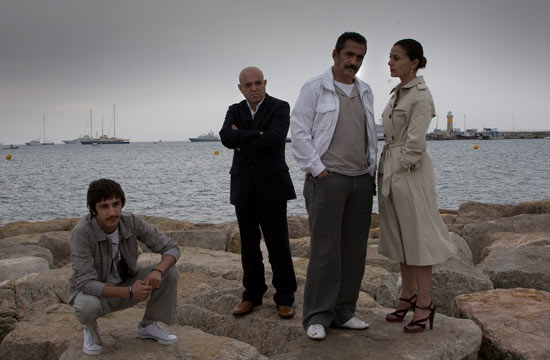 Actors of "Three Monkeys" in Cannes
Actors of "Three Monkeys" in Cannes |
... Three Monkeys is a noir-flavoured psychological thriller, which starts off close to Georges Simenon, slides more into James M Cain territory, and ends up vaulting into the Dostoyevsky league. A driver is persuaded by his politician boss to take the rap for a hit-and-run accident, in exchange for payment that will ease his family's financial troubles. The driver goes to prison; his son drifts into bad company; his wife gets involved with the politician – and when the driver gets out of jail, things slide toward even darker consequences.
Glenn Belverio, Dianepernet, 20 May 2008
... I have a sneaking suspicion that this wonderful film will walk off with the Palme d’Or. Why is a good question. The film is Turkish, and I’ve yet to meet a critic who can pronounce the director Nuri Bilge Ceylan’s name. The story is a mess. But it is a thing of mental, sonic and visual beauty. Forget Crystal Skulls; this is the real business of Cannes. The story is simple, but brilliantly told. A thrusting politician smacks into a man on a country road in the middle of the night. He asks his humble driver – who is nowhere near the crash – to take responsibility for a fat fee. Nine months in jail is chicken feed. The exquisite twist is the money, the horny wife and the angry grown-up son. The sweltering heat is in marvellous counterpoint to the tension. This is a must.
James Christopher, Times, May 22, 2008
... In contrast the Turkish writer/director of Uzak and Climates, Nuri Bilge Ceylan, did not disappoint with his latest film Three Monkeys. It’s a brilliant mystery thriller set around a dysfunctional family.
Kaleem Aftab, The List, 22 May 2008
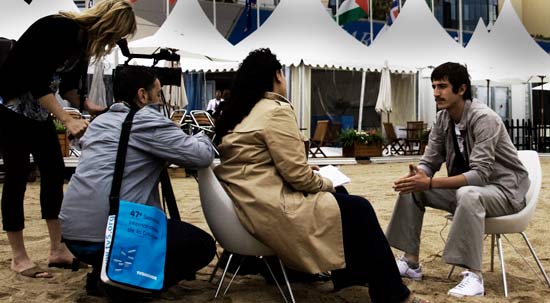 Interview with the actor Ahmet Rıfat Şungar
Interview with the actor Ahmet Rıfat Şungar |
...On the surface, the best film here so far for me – Nuri Bilge Ceylan’s ‘Three Monkeys’ – is only very superficially about incarceration, in that the story is quickly kick-started when a local politician facing elections persuades his driver to take the rap for him after the former knocks over a man with his car; in return he’ll pay his employee’s salary to his teenage son, and hand over a large lump sum when he emerges from prison after six months or so.
But if we actually see only a couple of prison-set scenes, when the son visits his father, that doesn’t mean that imprisonment isn’t a central, almost Dostoievskian metaphor for what happens to the driver, his wife and son, and the the politician. For that lie told to the cops is merely the first – and indeed the fount – of many more deceits that shape the increasingly twisted and dangerous interactions between the four protagonists, all of whom soon find themselves trapped like rats by their own fears, desires, doubts and suspicions.
This fifth feature is arguably the most ambitious film yet from the maker of ‘Uzak’ and ‘Climates’. It has the dry humour, assured pacing, astute psychological insights and sharp sense of moral and dramatic irony that has been conspicuous in all his work, but in many respects the film feels like an expansion upon ‘Climates’, not only in extending that film’s clear-eyed, unsentimental assessment of male-female relationships from a couple to a whole family and its acquaintances, but in exploring the rich potential afforded by digital technology; if you thought Ceylan’s photographer’s eye produced stunning images in ‘Climates’, ‘Three Monkeys’ pushes the envelope still further. It’s been bought for the UK, so when it turns up, see it – and marvel!
Geoff Andrew, Time Out (London), May 2008
... One of the best features in the first half of the festival was Nuri Bilge Ceylan's Three Monkeys, a brooding family tragedy that seemed inspired in equal measure by and Emile Zola's La Bete Humaine and Anton Chekhov. It's about an unscrupulous politician who kills a man in a hit-and run-accident. Rather than accept the blame, the politician bribes his driver to go to prison in his place. But the driver's wife has been having an affair with the politician and the driver's son is full of murderous rage.
Ceylan has talked of his desire to capture his characters' innermost emotions. Sometimes, he can hold those moody close-ups of his for just a little too long, but he is also a clever craftsman with a Hitchcock-like flair for cranking up the tension. Short on dialogue, but performed with ferocious intensity, Three Monkeys looks like a strong candidate for some kind of prize from Sean Penn's jury.
Geoffrey Macnab, The Independent, 23 May 2008
And many of us were anticipating masterpieces from the Turkish director Nuri Bilge Ceylan and from the Argentine filmmaker Lucrecia Martel, whose second feature, “The Holy Girl,” was a discovery of the 2004 festival. Many critics insist that “Three Monkeys,” Mr. Ceylan’s new film (acquired for American release by New Yorker Films), fulfills the promise of his earlier work, which includes “Distant” and “Climates.” But in trying something new — using his austere, exacting sense of form to tell a ripely melodramatic story — he seems to have sacrificed some of the wit that made those earlier films so memorable.
A.O.SCOTT, New York Times, May 23, 2008
Finally! For nine days, the 61st Cannes Film festival had doddered along into a premature senility. What we got, mostly, were cautious reprises of top directors, earlier pictures — from European minimalism, by Euro-faves like the Dardenne brothers and Nuri Bilge Ceylan (which, you have to admit, is a great name) — to Hollywood gigantism from the Indiana Jones team.
Richard Corliss, Time (USD), May 24, 2008
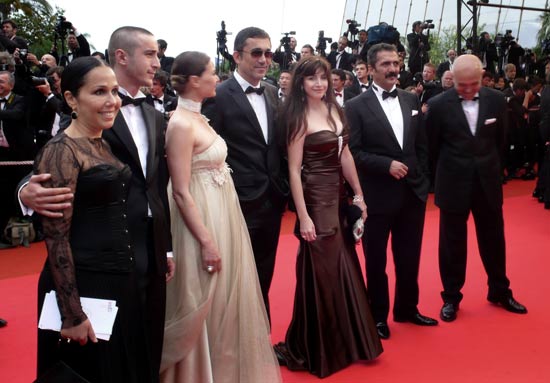 On the red carpet for the closing ceremony
On the red carpet for the closing ceremony |
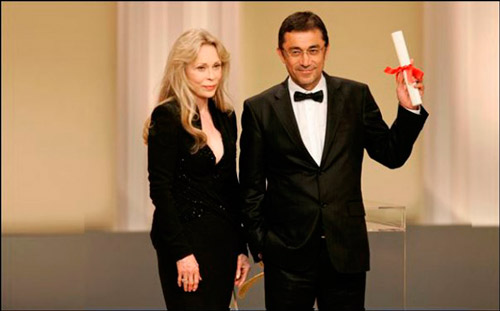 Ceylan receiving the "Best Director" Award from Actress Faye Dunaway
Ceylan receiving the "Best Director" Award from Actress Faye Dunaway |
International Press after the festival :
... TURKEY'S Nuri Bilge Ceylan won Cannes' Best Director prize today for his searing family drama Three Monkeys. Ceylan, almost 50 and already winner of a batch of awards for his first four features, is regarded as one of the most distinctive film-makers of the last decade. Three Monkeys, a tragedy revolving around jealousy, was his third appearance in competition at Cannes, where the movie was a critics' favourite among the 22 vying for the prestigious Palme d'Or award. Ceylan, maker of Uzak and Climates, is a master of psychological subtlety and intimacy, shooting meticulously beautiful images helped by his use of high-definition digital video.
News.com (Australia), May 26, 2008
... With no more than five films to his name, Turkey's Nuri Bilge Ceylan, who sprang to global fame with his 2006 break-up movie "Climates'', took home the best-director award. "Three Monkeys'' is the story of a Turkish chauffeur who goes to jail to cover for his politician boss and realizes, upon release, that his family's fortunes have improved in unorthodox ways.
Farah Nayeri, Bloomberg.com, May 25, 2008
... The elegant Nuri Bilge Ceylan (Turkey) won best director award for his Three Monkeys. He evokes marvellous performances from four principals and, as always, a great one from his camera.
Gerson Da Cunha, Outlook India, Jun 09, 2008
... Three Monkeys, Ceylan's noir masterpiece dealing with a family riddled with secrets, definitely deserved one of the festival's top awards.
Samir Farid, Al-Ahram, 4 June 2008
 Photocall after the Closing Ceremony
Photocall after the Closing Ceremony |
There was also Nuri Bilge Ceylan’s ‘Three Monkeys’, an isolated family drama that’s a move for this Turkish director into more layered, gothic territory than his earlier, sparser ‘Uzak’ and ‘Climates’. Atypically for Ceylan, this is a film full of events – the manslaughter of an unknown pedestrian by a politician whose driver he persuades to take the rap, followed by murder and adultery. Typically, he shows none of them.
Dave Calhoun, Time Out, June 2008
Three Monkeys, from the distinguished Turkish director Nuri Bilge Ceylan, is a supremely elegant and visually powerful film in which a son goes to exceptional lengths to defend his mother's honour. This is also a tale of corruption in high places and starts when a politician in the middle of an election campaign persuades his chauffeur to accept responsibility for a fatal hit-and-run accident that could end his career.
Unlike Eastwood's detailed, methodical approach to storytelling, Ceylan favours an elliptical style in which the widescreen images and the detailed soundtrack are of paramount importance. Ceylan has made fine films before, notably the remarkable Distant; this is one of his best and it deservedly won the best director award.
David Stratton, The Australian, May 27, 2008
Nuri Bilge Ceylan's Best Director award for 'Three Monkeys' was something that's hard to quarrel with. This is a film-maker whose sheer cinematic IQ pulses from every frame, every scene. I was and am agnostic about Three Monkeys itself - a drama about family guilt - because I think that simply too much has been shoehorned into the screenplay, but as with everything Ceylan does, it's a riveting watch.
Peter Bradshaw, Guardian, May 26, 2008
An unblinking gaze upon a new horizon
When the Turkish filmmaker Nuri Bilge Ceylan won the Best Director prize at the Cannes film festival last month for his film Three Monkeys , he dedicated the award “to my lonely and beautiful country”.
Turkey is certainly beautiful. Anyone who has seen the night sky over Anatolia, been spooked by the mountains of the east in the dark, traipsed across its ruins, lazed on its beaches, or gazed at the interior of Ayasofia in Istanbul – described recently by the historian Eamon Duffy in the New York Review of Books as “the world’s greatest religious building” – could not conclude otherwise.
But lonely? If Mr Ceylan had cultural isolation in mind, he may be wrong. Turkey is coming out of its shell; he is himself an example of the new creative wave.
Yet, in a wider sense, he is right. Although Turkey is indisputably opening up to the world, seeking to join the European Union, and is important in the geo-strategic game because of its location, it remains surprisingly aloof from – and even indifferent to – the ideas and trends shaping the world.(...)
Vincent Boland, Financial Times, June 10 2008
(...) The film also succeeds as a triumph in cinematography. The murky hues and sepia tones give "Three Monkeys" a dark and off-putting feeling. Wide angle shots of picturesque scenery and I-can't-believe-those-are-real clouds reinforce the film's grave message but also distract from the depressing view of humanity and offer the most memorable moments of the film. The juxtaposition of tightly-framed close up shots on the characters' eyes or faces as they stare into space with despair, avoiding each other and ignoring each other's presence, with sweeping wide angle shots jars the viewer. Watching Hacer and Servet argue from far away gives the viewer that rush of voyeurism: we shouldn't be watching this private encounter, but we have been given access to it and it's impossible to turn our eyes away. (...)
Kathryn Durfee, Filmphile, 18.6.2008
|
|
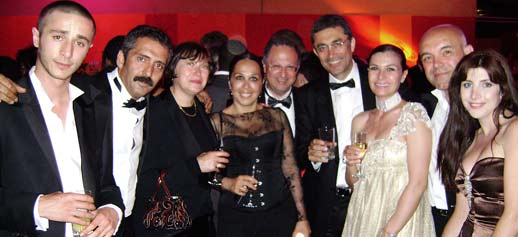 At the Official Dinner after the Closing Ceremony
At the Official Dinner after the Closing Ceremony |
- Turkish Press
For the Turkish Press during and after the Festival, please click here. (in Turkish)
( Cannes Film Festivali sırasında ve sonrasında Türk Basını için buraya tıklayınız. )
|
|
















